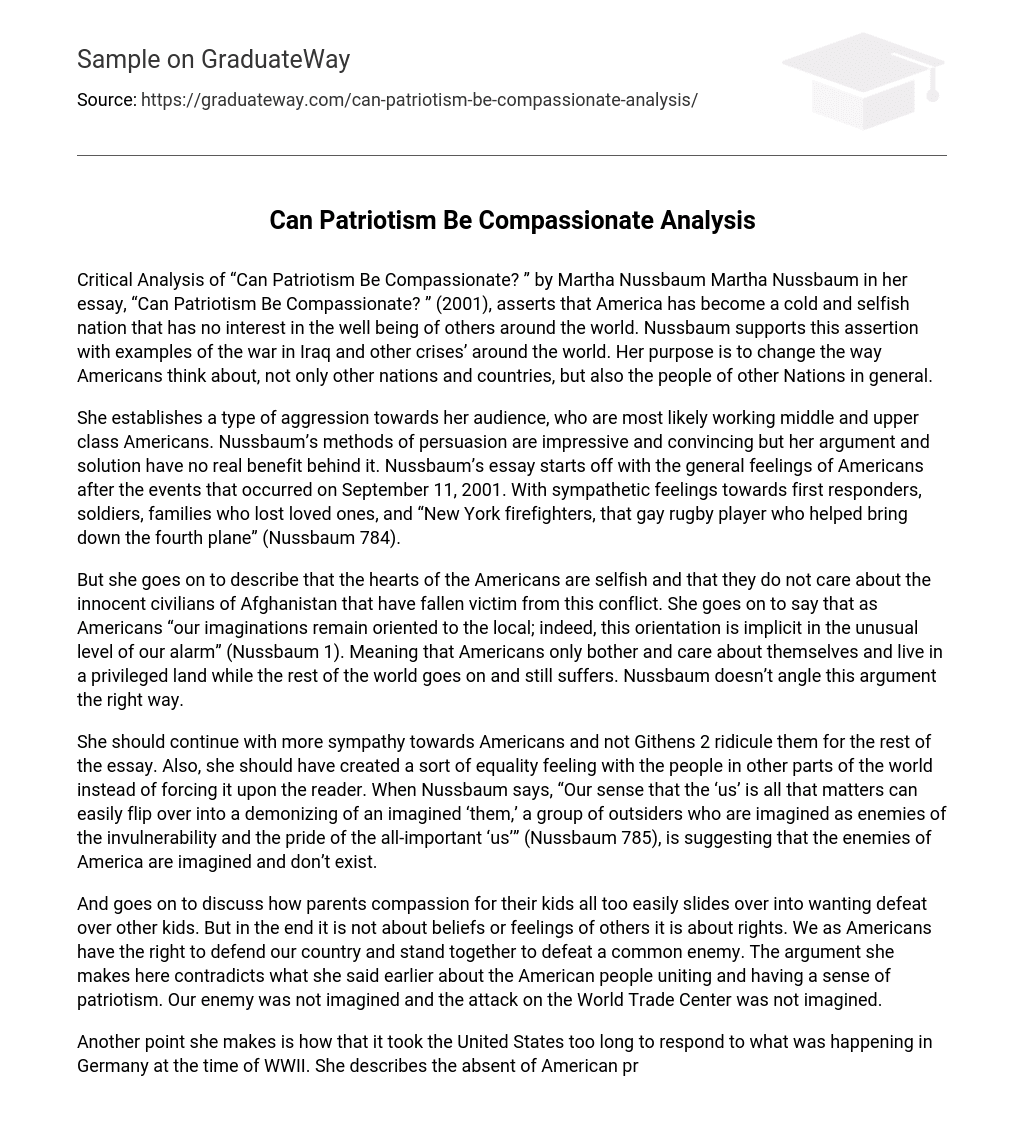Critical Analysis of “Can Patriotism Be Compassionate? ” by Martha Nussbaum Martha Nussbaum in her essay, “Can Patriotism Be Compassionate? ” (2001), asserts that America has become a cold and selfish nation that has no interest in the well being of others around the world. Nussbaum supports this assertion with examples of the war in Iraq and other crises’ around the world. Her purpose is to change the way Americans think about, not only other nations and countries, but also the people of other Nations in general.
She establishes a type of aggression towards her audience, who are most likely working middle and upper class Americans. Nussbaum’s methods of persuasion are impressive and convincing but her argument and solution have no real benefit behind it. Nussbaum’s essay starts off with the general feelings of Americans after the events that occurred on September 11, 2001. With sympathetic feelings towards first responders, soldiers, families who lost loved ones, and “New York firefighters, that gay rugby player who helped bring down the fourth plane” (Nussbaum 784).
But she goes on to describe that the hearts of the Americans are selfish and that they do not care about the innocent civilians of Afghanistan that have fallen victim from this conflict. She goes on to say that as Americans “our imaginations remain oriented to the local; indeed, this orientation is implicit in the unusual level of our alarm” (Nussbaum 1). Meaning that Americans only bother and care about themselves and live in a privileged land while the rest of the world goes on and still suffers. Nussbaum doesn’t angle this argument the right way.
She should continue with more sympathy towards Americans and not Githens 2 ridicule them for the rest of the essay. Also, she should have created a sort of equality feeling with the people in other parts of the world instead of forcing it upon the reader. When Nussbaum says, “Our sense that the ‘us’ is all that matters can easily flip over into a demonizing of an imagined ‘them,’ a group of outsiders who are imagined as enemies of the invulnerability and the pride of the all-important ‘us’” (Nussbaum 785), is suggesting that the enemies of America are imagined and don’t exist.
And goes on to discuss how parents compassion for their kids all too easily slides over into wanting defeat over other kids. But in the end it is not about beliefs or feelings of others it is about rights. We as Americans have the right to defend our country and stand together to defeat a common enemy. The argument she makes here contradicts what she said earlier about the American people uniting and having a sense of patriotism. Our enemy was not imagined and the attack on the World Trade Center was not imagined.
Another point she makes is how that it took the United States too long to respond to what was happening in Germany at the time of WWII. She describes the absent of American present in a negative way, “When at least some others were finding ways to rescue the Jews during the Holocaust, America’s inactivity and general lack of concern were culpable, especially in proportion to American power. It took Pearl Harbor to get us even to come to the aid of our allies” (Nussbaum 786). What she fails to mention is the politics that went behind choosing the decision of when to be involved in the war.
The belief that America should be the world police is a flawed idea. One country cannot be responsible for that much power or be responsible for the actions of other countries when it cannot control its own government. She uses quotes from Aristotle, Rousseau, Plato, and Socrates to try and persuade you to her side. By using these great philosophers she feels that she has logic and intellect on her side. She also transitions to using pathos by trying to make the reader feel guilty for being so insensitive to other nations and Githens 3 ultures feelings. The reader might start to agree with Nussbaum but if we do conform to what she believes is right what is the cost in the end. Her whole argument is mainly based on peoples feelings, when, in reality the world doesn’t run on peoples feelings. There are rules and guidelines that have to be followed. Nussbaum exhibits a sort of negative attitude towards the America thinking. She talks about how Americans are the least compassionate out of all countries, when in reality America is the most compassionate country in the world.
When you step back and take a look at all the organizations and charities that people own, have started, and/or exist you cant help but notice that Americans continuously give and give, at least those you can afford to give. In contrast to what Nussbaum is saying I believe that we as Americans have become too sensitive to that other nations and people think of us as Americans. We need to start worrying about our country and fix our problems before we even start to fix the worlds or even other countries problems.





